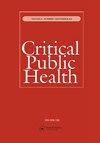The law of diminishing returns? The challenge of using freedom of information legislation for health policy research
IF 2.3
3区 医学
Q2 PUBLIC, ENVIRONMENTAL & OCCUPATIONAL HEALTH
引用次数: 1
Abstract
Freedom of information (FOI) laws are designed to increase transparency and political accountability. Where designed and implemented effectively, they can serve to catalyse public interest and democratic participation in politics, as well as exposing instances of corruption in, and influence over, the policy process (Fowler et al., 2013). A number of recent studies in the area of public health have drawn on data accessed through FOI requests (see for example: Lauber et al., 2021; Maani Hessari et al., 2019; Mitchell & McCambridge, 2023; Ralston, 2021; Robertson & Steele, 2023) including those published in the current journal (Glover et al., 2023; Sacks et al., 2018). Yet FOI laws remain underutilised as a research tool. This is due in part to the increasingly stringent application of disclosure exemptions within these laws. Below, we highlight examples of some of the difficulties encountered by health-policy researchers in the United Kingdom (UK) seeking to use FOI requests to access information held by public bodies, and the issues these raise for both scholarship and democratic oversight. While focused on the UK, these experiences are likely more widespread and of relevance to health and public policy researchers facing similar barriers in other contexts.收益递减法则?利用信息自由立法进行卫生政策研究的挑战
信息自由法旨在提高透明度和政治问责制。如果设计和实施有效,它们可以促进公众利益和政治民主参与,以及揭露政策过程中的腐败和影响(Fowler et al., 2013)。最近在公共卫生领域的一些研究利用了通过信息自由请求获得的数据(例如:Lauber等人,2021年;Maani Hessari等人,2019;Mitchell & McCambridge, 2023;拉斯顿,2021;Robertson & Steele, 2023),包括发表在当前期刊上的研究(Glover et al., 2023;Sacks等人,2018)。然而,信息自由法作为一种研究工具仍未得到充分利用。这在一定程度上是由于这些法律对披露豁免的适用越来越严格。下面,我们将重点介绍联合王国卫生政策研究人员在寻求利用《信息自由法》请求获取公共机构持有的信息时遇到的一些困难,以及这些困难给学术研究和民主监督带来的问题。虽然这些经验主要集中在英国,但它们可能更为广泛,对在其他情况下面临类似障碍的卫生和公共政策研究人员也具有相关性。
本文章由计算机程序翻译,如有差异,请以英文原文为准。
求助全文
约1分钟内获得全文
求助全文
来源期刊

Critical Public Health
Multiple-
CiteScore
5.90
自引率
7.10%
发文量
36
期刊介绍:
Critical Public Health (CPH) is a respected peer-review journal for researchers and practitioners working in public health, health promotion and related fields. It brings together international scholarship to provide critical analyses of theory and practice, reviews of literature and explorations of new ways of working. The journal publishes high quality work that is open and critical in perspective and which reports on current research and debates in the field. CPH encourages an interdisciplinary focus and features innovative analyses. It is committed to exploring and debating issues of equity and social justice; in particular, issues of sexism, racism and other forms of oppression.
 求助内容:
求助内容: 应助结果提醒方式:
应助结果提醒方式:


